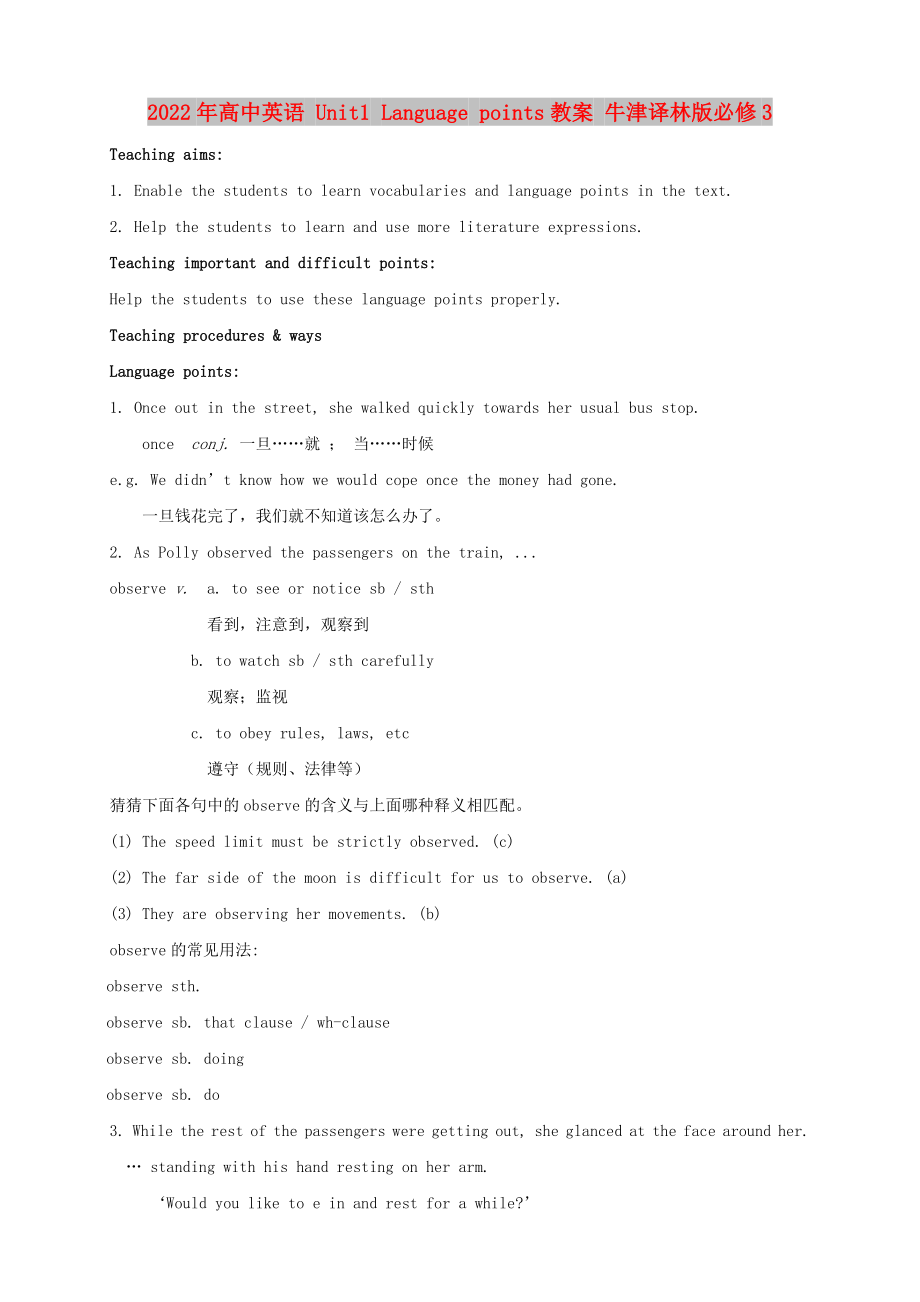《2022年高中英語(yǔ) Unit1 Language points教案 牛津譯林版必修3》由會(huì)員分享�,可在線閱讀,更多相關(guān)《2022年高中英語(yǔ) Unit1 Language points教案 牛津譯林版必修3(3頁(yè)珍藏版)》請(qǐng)?jiān)谘b配圖網(wǎng)上搜索��。
1���、2022年高中英語(yǔ) Unit1 Language points教案 牛津譯林版必修3
Teaching aims:
1. Enable the students to learn vocabularies and language points in the text.
2. Help the students to learn and use more literature expressions.
Teaching important and difficult points:
Help the students to use these language points pro
2、perly.
Teaching procedures & ways
Language points:
1. Once out in the street, she walked quickly towards her usual bus stop.
once conj. 一旦……就 ��; 當(dāng)……時(shí)候
e.g. We didn’t know how we would cope once the money had gone.
一旦錢(qián)花完了��,我們就不知道該怎么辦了����。
2. As Polly observed the passengers on the train,
3、...
observe v. a. to see or notice sb / sth
看到����,注意到,觀察到
b. to watch sb / sth carefully
觀察;監(jiān)視
c. to obey rules, laws, etc
遵守(規(guī)則���、法律等)
猜猜下面各句中的observe的含義與上面哪種釋義相匹配��。
(1) The speed limit must be strictly observed. (c)
(2) The far
4���、 side of the moon is difficult for us to observe. (a)
(3) They are observing her movements. (b)
observe的常見(jiàn)用法:
observe sth.
observe sb. that clause / wh-clause
observe sb. doing
observe sb. do
3. While the rest of the passengers were getting out, she glanced at the face around her.
… standi
5、ng with his hand resting on her arm.
‘Would you like to e in and rest for a while?’
注意主謂一致:
e.g. Here are some books, these two are for my brother, the rest of them are for you.
這有些書(shū)����,這兩本是給我哥哥的,剩下的是給你的��。
4. …, she glanced at the faces around her.
glance v. 瞥�,掃視,匆匆一看
e.g. She glanced
6����、at her watch.
她匆匆看了看表。
I only had time to glance at the newspapers.
我只來(lái)得及瀏覽了下報(bào)紙��。
注意區(qū)分:
? glance 匆匆一看��,瞥見(jiàn)
? stare 由于好奇�����,羨慕或恐懼等感情而
睜大眼睛,目不轉(zhuǎn)睛地注視一段時(shí)間����,有時(shí)會(huì)表現(xiàn)出無(wú)理或粗魯?shù)膽B(tài)度
? glare 怒目而視
? gaze 凝視美麗或令人驚嘆的東西
5. She could feel her heart beating with fear.
beat v. 有規(guī)律有節(jié)奏地拍打, (心臟)跳動(dòng)
7�、
e.g. She’s alive — her heart is still beating.
她沒(méi)死 —— 她還有心跳。
注意區(qū)分:
strike: (鐘)敲����;劃(火柴);
(災(zāi)害���,疾?。┮u擊
hit: 打����;擊
hit sb. on the (part of the body)
6. Polly found herself staring up at the face of an old man with a beard.
find oneself doing sth.
發(fā)覺(jué)自己處于某種狀態(tài)
e.g.
8��、When he woke up, he found himself lying under the bed.
他醒來(lái)的時(shí)候�,發(fā)現(xiàn)他自己在床下面。
7. Thank you so much for ing to my aid.
e to one’s aid 意為“幫助某人”
e.g. She had an accident and was trapped in her car. Luckily two passers-by came to her aid.
她出了交通事故�,被困在車(chē)?yán)?���。幸運(yùn)的是有兩個(gè)過(guò)路人向她伸出了援手�����。
難句解析
1. Once out in the
9����、street, she walked quickly towards her usual bus stop.
這是一個(gè)主從復(fù)合句。once引導(dǎo)一個(gè)省略了主謂語(yǔ)的時(shí)間狀語(yǔ)從句�,原句應(yīng)為Once she was out in the street。當(dāng)狀語(yǔ)從句的主語(yǔ)與主句主語(yǔ)一致��,并且從句中的謂語(yǔ)含有be時(shí)�����,則從句中的主語(yǔ)和be可以同時(shí)省略���。
e.g. When first introduced to the market, these products enjoyed great success.
這些產(chǎn)品第一次被推進(jìn)市場(chǎng)的時(shí)候��,獲得了巨大的成功�����。
2. As Polly obse
10���、rved the passengers on the train, she had a feeling that she was being watched by a tall man in a dark overcoat.
這是一個(gè)主從復(fù)合句�����。as引導(dǎo)時(shí)間狀語(yǔ)從句�,相當(dāng)于when�����,表示 “當(dāng)……時(shí)候”�。主句中含有一個(gè)that引導(dǎo)的同位語(yǔ)從句,從句中的was being watched為過(guò)去進(jìn)行時(shí)的被動(dòng)語(yǔ)態(tài)���。
e.g. Our teaching building was being built at this time last year.
我們的教學(xué)樓是去年這個(gè)時(shí)候建起來(lái)的���。
 2022年高中英語(yǔ) Unit1 Language points教案 牛津譯林版必修3
2022年高中英語(yǔ) Unit1 Language points教案 牛津譯林版必修3

